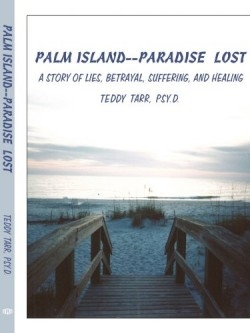It looks like you've stumbled upon a page meant to be read by our code instead of viewed directly. You're probably looking for this page.
Palm Island--Paradise Lost
A Story of Lies, Betrayal, Suffering, and Healing
Divorce has been described as the psychological equivalent of a coronary by-pass; Teddy Tarr would likely agree. She tells a sadly familiar tale describing a comfortable life as a successful psychologist and complacent wife that was abruptly shattered when after a pleasant weekend with friends her husband of twelve years suddenly asked for a divorce. “You have three days to gather your clothes and move out. I have fallen in love with a former love.” Palm Island the author’s favorite getaway off the Florida coast functions as a metaphor for the peace and fulfillment that she lost and struggled to regain when her marriage fell apart. Tarr traces her pathway down a rocky road of emotional and spiritual suffering a “pilgrimage” that eventually led her to a place of calm acceptance and renewed vitality.
For anyone under the impression that psychotherapists manage their lives more wisely than other people Tarr’s story vividly demonstrates that relationship professionals are as vulnerable to heartache as anyone else; a sophisticated knowledge of bereavement phases defense mechanisms and the like does nothing to lessen the emotional pain that such loss entails. She candidly admits that this marriage (her fourth) was filled with denial idealization and self-delusion. Nonetheless her training as a therapist helped her use her own experience of divorce to create this self-help manual.
Veering at times into the stylistic tar pit of psycho-babble Tarr gamely includes personal details of her personal struggle then draws on her professional experience to offer a way through for those suffering a similar loss. Offering strategies based in part on a bereavement model (related to standard bereavement theory in outlining stages of grief) originally used for her own clients prior to her divorce she takes the reader through sections aptly entitled “Surviving” “Striving” and “Thriving.” Tarr enhances the material with personalized examples and interpretations. Additionally at the close of each chapter she posts lessons and ideas for self-study and references some of the literature on divorce dating and related psychotherapeutic issues to help readers gain a fundamental understanding of their own reactions to loss and learn positive ways to cope and move forward.
The narrative unfortunately often fails to progress in a logical manner with topics looping back and forth throughout the text. More vigorous editing could have improved focus and momentum and might have dispelled some of the awkward prose. While the material is not particularly original the author’s personal honesty and hard work to regain her own sense of value are praiseworthy and her earnest desire to help others make the difficult passage through divorce is clearly heartfelt.
Reviewed by
Laurie Sullivan
Disclosure: This article is not an endorsement, but a review. The publisher of this book provided free copies of the book and paid a small fee to have their book reviewed by a professional reviewer. Foreword Reviews and Clarion Reviews make no guarantee that the publisher will receive a positive review. Foreword Magazine, Inc. is disclosing this in accordance with the Federal Trade Commission’s 16 CFR, Part 255.
